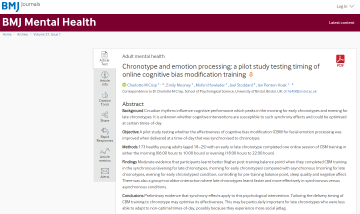Optimising timing of psychological interventions could improve their effectiveness
- 15 July 2024
Delivering some psychological interventions at times suited to a person’s chronotype (when they are naturally likely to wake up and go to sleep) could improve how effective the interventions are. Initial evidence from a study supported by the NIHR Bristol Biomedical Research Centre has shown that late chronotypes (or ‘night owls’) could benefit most from taking part in interventions scheduled later in the day.
Researchers asked 173 young adults to complete Cognitive Bias Modification (CBM) training in either the morning or evening. CBM is aimed at changing biases in a person’s thought processes, such as a tendency to label ambiguous facial expressions as negative rather than positive. Negative cognitive biases could contribute to depression and being a night owl is also a risk factor for the condition.
Chronotype refers to when someone is likely to naturally fall asleep and wake up. Most people describe this as being either an early bird or a night owl. The study team found moderate evidence to suggest that participants learnt better when they were able to complete their CBM session at a time that suited their chronotype (evening for night owls, morning for early birds).
The study team also found that this may be particularly important for night owls who were less able to adapt to non-optimal times-of-day, possibly because they experience more social jetlag. Social jetlag is a misalignment between when a person is likely to be most awake and when society might expect them to be most active.
Night owls may experience more social jetlag if they prefer to go to sleep later but still must go to school or work at 9am. This may contribute to sleep restriction during the week which may be compensated for at the weekends. Social jetlag may act as a chronic stressor that interacts with other factors such as genetics to increase someone’s risk of developing depression.
Dr Charlotte Crisp, lead author, said:
“Chronotype might be an important consideration for tailoring psychological interventions because of its influence on alertness, mood and cognitive function.
“Our initial evidence suggests that online psychological interventions can be optimised if they are delivered at a time-of-day that is synchronised to chronotype. This might be most important for night owls as they are vulnerable to poor mental health.
“During our study, we showed that night owls learnt better and faster when training was delivered in the evening, compared to the morning. This provides initial evidence that night owls are less able to adapt to completing CBM training at non-optimal times-of-day compared to early birds.”
